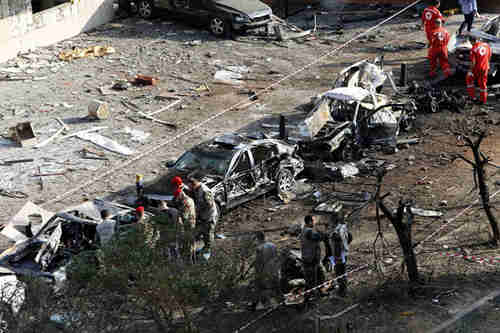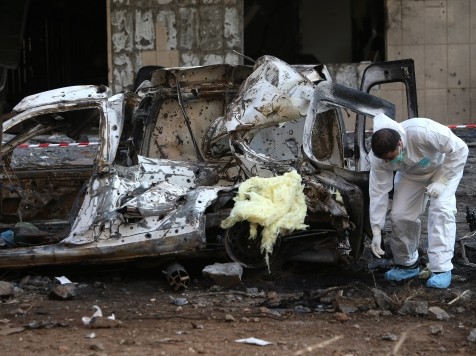
This morning’s key headlines from GenerationalDynamics.com
- Lebanon bombing sharply escalates sectarian Mideast conflict
- Japan’s anti-China diplomacy given boost by Typhoon Haiyan
Lebanon bombing sharply escalates sectarian Mideast conflict

Bomb site outside of Iranian embassy in Lebanon on Tuesday (AFP)
Twin suicide bombers attacked the Iranian embassy in a super-securearea of Beirut, the capital of Lebanon, killing dozens. The firstsuicide bomber approached on a motorcycle, and did relatively littledamage. As crowds rushed to the scene, a second suicide bomberarrived in a large Sports Utility vehicle, packed with explosive. Atleast 25 people were killed, and hundreds were injured. One of thosekilled was an Iranian diplomat.
Iran’s foreign ministry called it “an inhuman action,” and reflexivelysaid, “The Islamic Republic of Iran takes the Zionists and theirmercenaries responsible for this action.” But as the Iranians andeveryone else know, it’s much more likely that the perpetrators areSunni jihadists who are targeting Shia Iran and Hezbollah for theirsupport of Syria’s president Bashar al-Assad. In fact, in view oflast week’s desperate statement by Iran’s foreign minister warning ofthe rise of Sunni jihadists, it’s possible that the Iranians wereaware that something like this was coming. (See “12-Nov-13 World View — Iran’s statement on Syria shows signs of desperation”)
The al-Qaeda linked Abdullah Azzam Brigades have taken credit for thebombing, which appears to be a major new step in the escalation of thesectarian Sunni versus Shia conflict in the Mideast. The trigger thatstarted this growing sectarian conflict is the actions by Syria’sShia/Alawite pathological genocidal monster, Bashar al-Assad, usingeverything from mortars to chemical weapons to kill innocent Sunnicivilians in Syria. But the conflict has been made much worse by thecatastrophic actions of Russia and Iran in supplying weapons andfighters to support al-Assad in his mass slaughter. This has drawnSunni jihadists, sometimes funded by Saudi Arabia, from countries nearand far to come to Syria to fight against al-Assad. The war may havebeen largely restricted to Syria up till now, but Tuesday’s bombing isa major step forward, on the road to a major war engulfing the entireMideast.
At any rate, Tuesday’s bombing is blowback from Iran’s own actions,and is well-deserved retribution. So what’s Iran going to do now? Ifthey strike back against the Saudis, they’ll escalate the war; if theydon’t, they’ll show weakness, and invite more bombings. We’ll have tosee how Iran resolves this conundrum. Daily Star (Beirut) and Fars News (Tehran) and CS Monitor
Japan’s anti-China diplomacy given boost by Typhoon Haiyan
Since taking office less than a year ago, Japan’s prime ministerShinzo Abe has visited all ten members of the Association of SoutheastAsian Nations (ASEAN), a first for a Japanese leader. AlthoughCambodia and Laos have traditionally been close to China, Abe expectsthe other eight countries to join Japan in a united front againstChina in the numerous territorial disputes in the region. Inparticular, China is claiming territory in the South China Sea thathas historically belonged to Vietnam, Brunei, Malaysia, Indonesia andthe Philippines, while Japan itself is facing daily militaryconfrontations with China around the Senkaku/Diaoyu islands.
Japan’s case has been boosted by China’s niggardly aid response to theTyphoon Haiyan. (See “19-Nov-13 World View — Philippine typhoon disaster draws clear lines between US and China”.) According to one Japanese analyst:
“Some ASEAN member countries are very much vulnerableto China’s economic and political influence. [By boostingmilitary cooperation,] we are giving assurance we will stand bythose ASEAN member countries. As China’s neighboring countriesdevelop their own capability, China needs to think twice beforetaking assertive actions.”
On the other hand, China’s government-run news agency hits back:
“But Abe has not yet held formal talks with leadersfrom China and South Korea, with whom ties have been stalled bythe hawkish Japanese leader’s hard-line policy on territorialdisputes and his unapologetic attitude toward Japan’s 20th-centurywartime atrocities in the two countries.”
Bloomberg and China Daily
Permanent web link to this article
Receive daily World View columns by e-mail

COMMENTS
Please let us know if you're having issues with commenting.